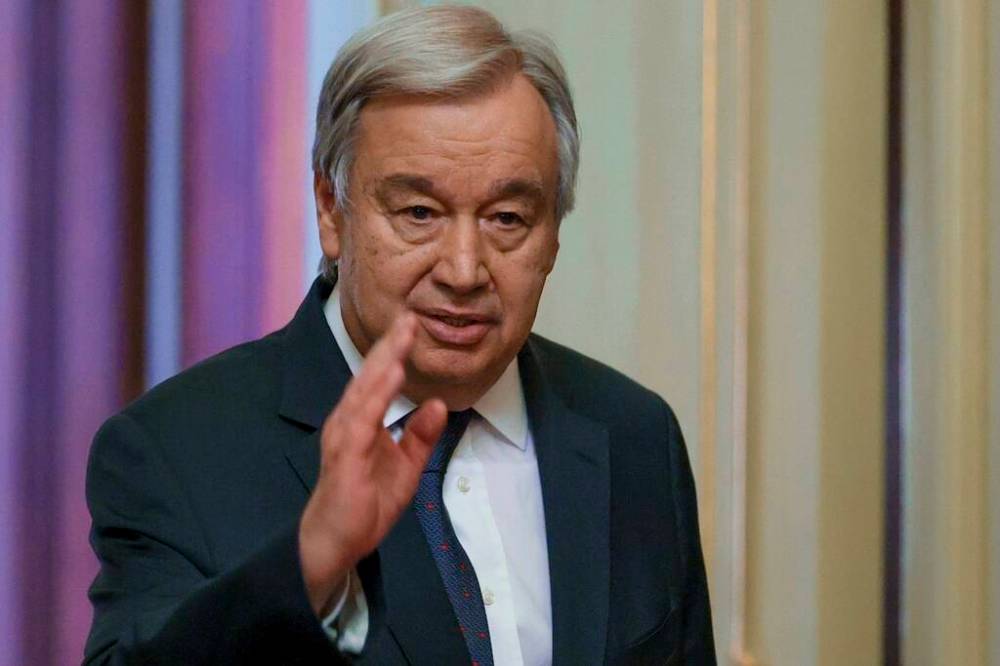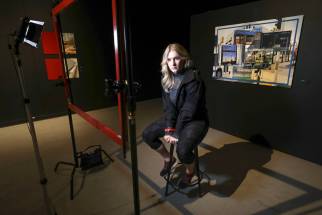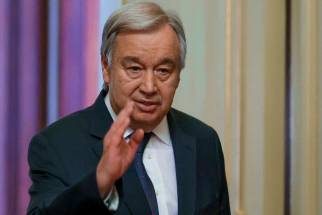UN in its current state is no longer relevant
Read this article for free:
or
Already have an account? Log in here »
To continue reading, please subscribe:
Monthly Digital Subscription
$0 for the first 4 weeks*
- Enjoy unlimited reading on winnipegfreepress.com
- Read the E-Edition, our digital replica newspaper
- Access News Break, our award-winning app
- Play interactive puzzles
*No charge for 4 weeks then price increases to the regular rate of $19.00 plus GST every four weeks. Offer available to new and qualified returning subscribers only. Cancel any time.
Monthly Digital Subscription
$4.75/week*
- Enjoy unlimited reading on winnipegfreepress.com
- Read the E-Edition, our digital replica newspaper
- Access News Break, our award-winning app
- Play interactive puzzles
*Billed as $19 plus GST every four weeks. Cancel any time.
To continue reading, please subscribe:
Add Free Press access to your Brandon Sun subscription for only an additional
$1 for the first 4 weeks*
*Your next subscription payment will increase by $1.00 and you will be charged $16.99 plus GST for four weeks. After four weeks, your payment will increase to $23.99 plus GST every four weeks.
Read unlimited articles for free today:
or
Already have an account? Log in here »
Hey there, time traveller!
This article was published 02/05/2022 (1319 days ago), so information in it may no longer be current.
Nations opposed to Russia’s brutal war of attempted conquest against Ukraine must surely share Canada’s frustration with the inability of the United Nations to act against Russian aggression. Prime Minister Justin Trudeau and Foreign Affairs Minister Melanie Joly should find out if like-minded countries are interested in starting a new United Nations free of the Russian veto.
The countries that won the Second World War started the UN we have today as a means of making sure the planet would not again suffer another war like those that afflicted the world from 1914 to 1918 and again from 1939 to 1945. The Soviet Union, which played a huge role in defeating Nazi Germany, naturally qualified as a great power at the time and was granted a veto in UN security council decisions alongside Britain, France, China and the United States.
Post-Soviet Russia somehow inherited the Soviet veto from the ruins of the Soviet Union, though Russia today is a mere shadow of the old Soviet empire. Its population is shrinking, its economy is in rapid decline and its army cannot even defeat that of neighbouring Ukraine.

By shelling the Ukraine capital Kyiv last week during the visit of UN Secretary General Antonio Guterres, Russia showed its contempt for the UN. It also ruled itself out of consideration as a contributor to world peace and collective security.
Attempts to reform the UN have run into many obstacles, one of which is the Russian veto. As long as UN rules treat Russia as a great power and a force for world peace – though it is neither – the United Nations cannot reform itself from within.
Peace-loving nations that want a world body able to preserve peace and security might, however, be able to start from scratch as did those of 1945 and erect a new body in which Russia would have a role befitting its actual position as a middle-rank trading nation and a chronic aggressor with imperial ambitions.
The watching world should not try to wait out President Vladimir Putin in the hope his death, retirement or replacement will put Russia on a peaceful path. Russians have not removed him from power during two months of fruitless and disastrous war against Ukraine. His ruling group, whatever their private views may be, are sticking with him.
Starting up a new world body to preserve peace and security will be difficult.
Starting up a new world body to preserve peace and security will be difficult. Faded empires such as Britain and France will try to defend ancient privileges. Emerging empires such as China and India will demand status matching their ambitions. Germany will feel it has sat long enough in the penalty box. But if the world is sufficiently disgusted with Russia’s conduct and with the current impotence of the UN, a basis for agreement may perhaps be found.
Perhaps it’s time for Mr. Trudeau and Ms. Joly to set a group of scholars and diplomats to work collecting design ideas for a new world peace and security body. They could invite conversations with like-minded governments about early steps that could be taken toward building a wide consensus on the need for a new body free of Russian obstruction.
Canada doesn’t have to dominate the discussion and doesn’t have to like everything about the result it achieves. But somebody should start the ball rolling, and no one is better placed than Canada to play that role. If Russia sees what is afoot, comes to its senses and ceases its aggression, that could also be a good result.





